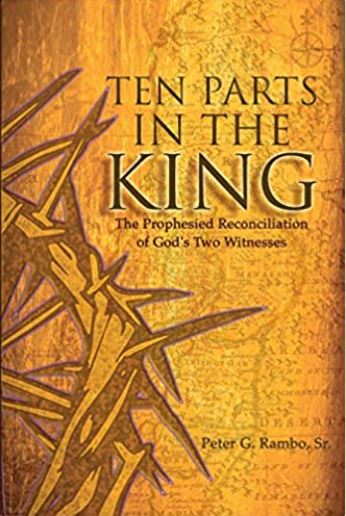As I began preparing for this week’s Shabbat, knowing it would fall on the eve of Purim, I prayed and asked Abba for ‘new eyes’ in the Book of Esther. As my regular readers know, I  love to tease out the prophetic hints and deeper pictures contained in the stories and history recorded in the Tanak. I believe Esther offered some new vistas I had not seen before.
love to tease out the prophetic hints and deeper pictures contained in the stories and history recorded in the Tanak. I believe Esther offered some new vistas I had not seen before.
I think most regard Esther as a book of prophecy. I do. In the past, understanding the role of the characters was a little different than this time through, so let’s take a brief look, one which I will expand for our Shabbat reading, a recording of which now appears on Davar Chaim’s blog.
Who is the king? Who is Vashti? Esther? Mordecai? And, Haman?
I’ll ‘give away the farm,’ right up front, then substantiate with Scripture. I would encourage you to dig deeper and prove/disprove these things for yourself.
Ahasuerus, the king, reigns over the entire known world, 127 provinces stretching from India to Ethiopia and has all authority. This one is easy. As most of us previously thought, Ahasuerus represents the King of Kings, Lord of Lords.
The King desires a bride! Vashti is His bride. He displayed His glory for all to see and ‘on the seventh day’ (1:10) He commanded her to come into His presence in order ‘to display her beauty for all to see, for she was beautiful (1:11).’ Yet, she refused. Vashti represents Christendom, the comfortable bride who refuses to be obedient to the King’s command (1:12 & 16) and come into His presence on the seventh day. As such, she embarrasses Him publicly!
Vashti is allowed to remain in the kingdom, but is barred from coming before the King and her royal position is given to another who is more worthy than she (1:19). Matthew 5:19, “Whoever then annuls one of the least of these commandments, and teaches others to do the same, shall be called ‘least in the kingdom’ of heaven…” Vashti has been relegated to ‘least’ because of disobedience.
A search of ‘every tribe, tongue and nation’ (Rev. 5:9; 7:9; 17:15), leads to the gathering of beautiful young virgins (2:3) to the capital city of Susa (Jerusalem) where the King dwells. Esther is this beutiful, young bride who has no lineage, or, it is masked (2:7), and, she is adopted by ‘the Jew’ (2:7). She is related to the Jews (2:15), but that tie is not clearly made before the people until the end of the story. Esther is Ephraim, coming out of the nations. Notice that 2:6 specifically spells out that at the time of this story (prophecy) both Jews and Esther are in exile. Even today, both are still in the nations, though Judah is coming home, even as Esther/Ephraim is being refined.
Esther’s refinement includes a period of purification and separation (2:12). She only gets to see the King is if ‘He delights in her (2:14).’ Esther, daughter of Avihail, ‘my Father is might,’ finds favor in His eyes (2:15) and becomes His bride in the seventh year of His reign (seventh millennium? 2:16).
Verse 2:20 tells us something interesting about Esther. She doesn’t look like Mordecai, but she learns of him and follows his ways and instruction. Mordecai is the knowledgeable one who is in the position of authority. For our picture, Ephraim does not and will not look like Mordecai the Jew, but Ephraim will respect and learn of Mordecai the Jew.
The text tells us at least eight times that Mordecai is a Jew (2:5; 3:4; 5:13; 6:10; 8:7; 9:29, 31; 10:3). Mordecai is loyal to the Great King, even though persecuted. He refuses to bow down or pay homage to Haman (3:2). He operates without glory or elevation (2:23), yet, he is elevated and rewarded in the end as is prophesied for the Jews. Mordecai represents Judah.
The archenemy of the Jews is Haman the Agagite. Haman, meaning ‘magnificent,’ is filled  with rage at Mordecai the Jew (3:5) and seeks to destroy him and his brethren (3:6). He is the accuser of the brethren and does so before the Great King (Esther 3:8-9; Job 1 &2). One of Haman;s chief sins is his pride (5:9ff). The Great King gives him permission and His signet ring, but as we see historically and prophetically, his actions will lead to his own entrapment and destruction as the tables are turned on him (7:10). Haman represents hasatan, the adversary.
with rage at Mordecai the Jew (3:5) and seeks to destroy him and his brethren (3:6). He is the accuser of the brethren and does so before the Great King (Esther 3:8-9; Job 1 &2). One of Haman;s chief sins is his pride (5:9ff). The Great King gives him permission and His signet ring, but as we see historically and prophetically, his actions will lead to his own entrapment and destruction as the tables are turned on him (7:10). Haman represents hasatan, the adversary.
This story is as much about the salvation, elevation and preservation of Mordecai and Esther as it is about the destruction and damnation of Haman. It is a microcosm of the story of Scripture!
As our story unfolds, we find the planned destruction of all the Jews in the known world, with Susa in confusion and Haman partying (3:14). It is interesting to note that this edict for destruction was sent out the day before Pesach (3:12). Esther grieves for her adopted father and her people as she writhes in anguish and she seeks to bring relief to them (4:4). Notice it is not Vashti who is concerned. Even today, Vashti has little regard for Mordecai.
Esther demonstrates a rare quality. She fears the Great King! Throughout the Book of Esther, there seems a great air of familiarity between all the characters and the Great King with the notable exceptions of Esther and Mordecai. Our Great King loves and cares for us, but we must always hold Him in the highest regard, approaching with fear and trembling!! Also, if we are unwilling to be associated with Mordecai and the Jews, our day of destruction will come (4:13-14)!! Our ‘lot’ is with Mordecai the Jew, not hiding among the nations.
It is ‘on the third day’ wherein Esther puts on her royal robes and stands in the inner court on behalf of Judah (5:1). Interestingly, as this approach to the Great King happens, it is Mordecai who is obedient to Esther (4:15-17). It is a mutual respect as seen in Isaiah 11:13 (see in context). Only through persecution and standing with Judah will we gain respect and erase centuries of hurts, eliminating jealousies and harassment.
The Great King neither slumbers nor sleeps (6:1; Psalm 121:4) and He always shows up exactly on time (6:4). It is important to note that Mordecai was not outwardly upset about not being rewarded for saving the King’s life (reputation?). When we are not immediately rewarded for walking in integrity and obedience, we must understand that just maybe, the Great King is storing up that reward for the right time (6:10-11)! Further, when Mordecai is honored, it doesn’t ‘go to his head,’ rather, he immediately returns to his post of work interceding before the King’s gate (6:14).
Haman, in a last ditch attempt, assaults the Bride, Esther (7:8; Rev. 12:17), however, again the King shows up right on time!
Hasatan is the Prince of the World, but all he has is given to the Bride (8:1), and she sets Mordecai over it, representing the two sticks ruling and reigning together as fellow heirs. Further, Judah is given the signet ring. Notice, even after this great victory and the tables being turned, Esther is falling at the King’s feet and seeking His favor (8:3-5).
Through Esther and Mordecai, the Jews throughout the world are given authority to protect themselves and plunder the enemy (8:11). They protect themselves, but refuse the plunder as they know they are favored before the King and have no need of anything because the dread of Mordecai had fallen on the world (9:2-5). They also use the sword to bring justice against their enemies.
There are many, many more details in the story worth exploring from this angle, but I’ll only point to two in closing. In 8:15 we find Mordecai wearing robes of blue and white, a large crown of gold and a garment of fine linen and purple. Blue always points to Torah and white to righteousness. The gold crown points to rulership as do the garments of fine linen ad purple. The scepter shall not depart from Judah (Gen. 49:1)!
Mordecai, at the end, has an appearance much like the Mashiach. His ‘role’ in the picture seems to change as the last verse of the book says,
“For Mordecai the Jew was second only to King Ahasuerus, and great among the Jews and in favor with his many kinsmen, one who sought the good of his people and one who spoke for the welfare of his whole nation.”
That verse could be written of Messiah!!
The Book of Esther demonstrates again that Biblical history is also prophecy! We have seen that with Elijah, Ezra, Joesph and others. Esther presents us with a roadmap and hope! I pray this little study has blessed you!! Please consider sharing it.
Shalom!




















































































































So, we as Ephraim should be celebrating our sister Esther’s feast with as much respect as Judah?
LikeLike
We as a fellowship do celebrate, but with worship… Not ‘mirth and froth.’ 🙂 (It is my understanding that some Rabbinic tradition involves imbibing until one cannot enunciate the different between two phrases, one having to do with Mordecai and the other Haman, which I do not remember…)
I personally am careful not to place the same weight on this day, though clearly mentioned in Scripture, as I do the Feasts of Yahweh. It is and should be a day of great rejoicing in and worship of the Sovereignty and Might of our King in the past and future preservation of all His people!!
LikeLike
I agree. To me, reading, digesting and understanding the story of Esther, is a revelation. Having a love for The King, seeking His face and having a heart for my people who are oblivious to Torah and all of God’s lovegifts like Sabbath and the Feasts, makes me comprehend the significance of being able to say, If I perish I perish. By the time you are at a place where you can honestly say that, being so focused on your cause, you are on holy ground, that is not words to be taken or spoken lightly. Then, you can worship and thank Abba for a example like Esther and the hope it gives us for the times we live in.
LikeLike
Someone today sent me an email about Esther with the title of the attached article as, ‘There is no “I” in “Queen.” Esther was selfless and willing to lay down her life for her people….
LikeLike
Here’s a thought. Esther told Mordechai to have the Jews of Shushan fast for three days, neither eating nor drinking, in preparation for her going to see the King (Esther 4:17). The events of Esther happened close to 2,500 years ago (483-479 BCE). That’s two and one-half days (a day is a thousand years), which in Hebrew counting would be three days. So Judah and Ephraim have been out of the presence of the King for three days, in a sense fasting because the Bread of Life and the Living Water is not actually with us. And if you really want to play with the numbers, consider that the conquest of Samaria (721 BCE), or even the split of the Kingdom under Jeroboam I (c 931 BCE) were 2700 and 2900 years ago, meaning we have been in separation for almost entirely three days.
LikeLiked by 1 person
Agreed! Many great pictures in this book. Covered a few more today at Shabbat as we read/discussed Esther.
LikeLike
I hope you taped todays teaching-love to hear more
LikeLike
We did. Just have to edit and clean up before posting. Hope you guys had a good trip.
LikeLike
Pingback: Shabbat 3.15.14. Purim, Esther & Ephraim. | Davar Chaim
Awesome brother!! Hit it out of the ballpark!!
LikeLike
Thank you my friend. Was a great conversation with you the other day batting this around and bouncing thoughts off of you!!
LikeLike
Prior to reading this I explained this concept to some friends on Facebook. They are having a hard time understanding who Vashti is and why she didn’t appear. Their take on this is that the king was drunk as were the other men and by asking her to come unveiled, to them meant naked, which is why she didn’t obey. I have to admit, that even though I can see everything…the problem with them drinking for 7 days is a stumbling block to some extent. Can anyone shed some light on this?
LikeLike
We discussed this a bit yesterday in our Shabbat service. Several points were made:
1. The text doesn’t say the king was drunk. Just merry…
2. Scripture says wine makes the heart glad and in that context does not condemn it. In fact, with some feasts, a bit is encouraged.
3. Wine is often a metaphor for other things, and the underlying message may be different, though we did not pursue this thought further…
4. Bottom line, she KNEW she was rejecting the king and leading to great embarrassment on his part. Culturally, she knew full well what it meant to disobey his command…
As we explored, the whole story may be history, but even moreso, is prophecy. Hard to justify Vashti’s actions or consider Abba’s use thereof for His purposes. (Thinking of Yahweh hardening Pharaoh’s heart… Interesting side line.)
Shalom and welcome!!
LikeLike
A couple other “telling” characteristics to Vashti to consider:
1. Remember, she was busy having her own feast for the other ladies in the royal house (1:9). I believe it wasn’t so much her being offended at doing her job per her job description. Remember, she was to come with the Royal Crown on her. There’s no mention of anything inappropriate going on here (this is a common argument to justify her disobedience and a carryover from the unbiblical theological bent against obedience to Torah).
2. By refusing and doing her own thing (which is not according to the law, as are the kings doings) she is establishing her authority above that of the kings. Sound familiar? It should. The Roman Catholic church has held this position since it’s beginning. Unfortunately there’s only one individual mentioned in scripture, that I know of, that changes times and it appears to come from Rome. You can read about it in Daniel 7:24,25.
3. The other princes realize that if Vashti’s insolence is allowed to continue it will bring contention and wrath (confusion) throughout the kingdom. I believe that fact is self evident today. Because this has been allowed to go on for 1700 years or more we have a world filled with disobedience defined as liberty, wars, disease, and every kind of evil not only allowed but even protected many times. Yea, Haman is at work alright. Hopefully he’s about to be dealt with as well as his 10 sons.
LikeLike
Another point (among many) to consider is the irrevocable nature of the law of the land. When the decree to kill all the Jews went out it could not be revoked. Another Law was added to he books that allowed the Jews to arm themselves and not just defend their families but also go so far as to eliminate the entire enemies families from the face of the earth and take all the spoil. They only killed the heads of the households and left the families and spoil (much like they did when entering the Land). Also when deciding on what was to be done with Haman’s 10 sons Esther was given the choice but diverted the authority to the King (“if it please the King”, 9:13) and only made a suggestion. She knew that her life was hidden in Him and any authority given to her was under Him. Does this sound familiar? It should, the following verse sheds some light on this: Joh 15:1 I am the true vine, and my Father is the husbandman.
Joh 15:2 Every branch in me that beareth not fruit he taketh away: and every branch that beareth fruit, he purgeth it, that it may bring forth more fruit.
Joh 15:3 Now ye are clean through the word which I have spoken unto you.
Joh 15:4 Abide in me, and I in you. As the branch cannot bear fruit of itself, except it abide in the vine; no more can ye, except ye abide in me.
Joh 15:5 I am the vine, ye are the branches: He that abideth in me, and I in him, the same bringeth forth much fruit: for without me ye can do nothing.
Joh 15:6 If a man abide not in me, he is cast forth as a branch, and is withered; and men gather them, and cast them into the fire, and they are burned.
Joh 15:7 If ye abide in me, and my words abide in you, ye shall ask what ye will, and it shall be done unto you.
Joh 15:8 Herein is my Father glorified, that ye bear much fruit; so shall ye be my disciples.
Joh 15:9 As the Father hath loved me, so have I loved you: continue ye in my love.
Pay careful attention to the word “clean” in verse 3 and remember Esther’s purification. Also notice the branches that do not bear fruit (Haman and his sons) are destroyed. The motivation and driving force of everything in this passage. It’s love, and that of the King of all Kings to boot!! How is it expressed from us to Him? By abiding in Him (faith) and His words abide in you (works). So simple a child can understand it and takes an (self proclaimed) intellectual to complicate!!
LikeLike
Excellent additional thoughts, Trav!!
LikeLike
And was just listening to Holissa Alewine’s purim teaching and comparing how Sarah died at 127 as well. So many fun ties
LikeLiked by 1 person